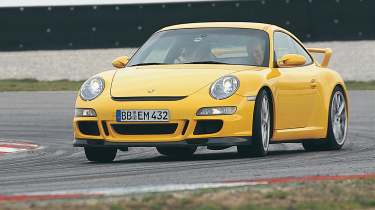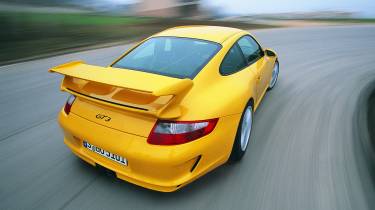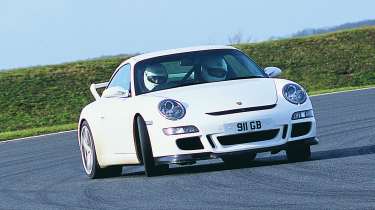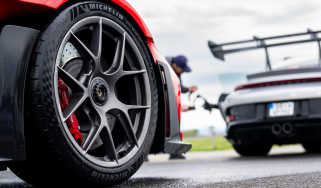Porsche 911 GT3 (997, 2006 - 2011): the ultimate modern classic?
The 997 GT3 had quite the baton to take; that of the definitive driver’s Porsche 911 of the 21st century. History tells us it managed as much and then some in both its iterations
In 2024 the 997 Porsche 911 turned 20 years old, as the GT3 as a breed turned 25. In some ways, the 997 was the water-cooled 911 reaching a new zenith, off the back of the 996 that had its fits and starts. The same goes for 2006’s 997.1 GT3, which boasted an increased breadth of ability in all areas, from general road manners to ten-tenths thrills.
The updated (997.2) GT3 of 2009 had more of everything again, from power and performance to sheer pace down a road, with a larger engine, deftly-honed dynamics and a more premium look and feel inside and out. Overall, the 997 GT3 was almost as much of a jump from sports car stalwart to supercar pretender from the 996, as the 991 was from the 997. Here’s a definitive guide to the 997 Porsche 911 GT3.
> 2025 Porsche 911 GT3 revealed: 992.2 adds S/T and RS knowhow
At launch, the 2006 997 GT3 had evo’s John Barker wondering if it had gone slightly soft, with its optional electrically adjustable sports seats – the Carrera GT buckets were of course an option and what the 997 GT3 is most famous for using, paired with a fairly serious cage and harness – sat-nav, air con, a sunroof and cruise control. The reality was of course, quite to the contrary.
More reviews
Group tests
Long term tests
Reviews
- Porsche 911 Carrera S 2025 review – a 473bhp BMW M4 CS fighter
- Porsche 911 GT3 (992.2) 2025 review – the best GT3 yet?
- Used Porsche 911 GT3 (991, 2013 - 2019) review, specs and buying guide
- Porsche 911 Targa 4 GTS 2025 review – the 911 that shouldn’t make sense
- Porsche 911 Carrera GTS 2025 review – the best 992 Carrera yet
‘You might even be tempted to think of the 997 GT3 is a Carrera S with a bodykit, stiffer suspension and a bit more power. You might be wrong, of course.
‘The differences between the GT3 and the regular 997 Carrera start literally from the ground up. In effect, it is an homologation special, a car designed and developed with the motorsport aspirations of the racing GT3s in mind, and this influence goes to the core of its structure and penetrates the very heart of its flat-six engine.
‘All GT3s were built around the floorpan of the four-wheel-drive Carrera 4, for the extra stiffness its transmission tunnel confered and because the front end, minus the differential, allowed the fuel tank to be mounted lower. The bonnet and doors are made of aluminium, the engine cover of a plastic composite. Porsche’s engineers claimed that, compared with the 996 GT3, the 997 is eight per cent stiffer corner to corner, and 40 per cent stiffer front to rear. And that’s for a car that, like for like, weighs 5kg less than the 996 GT3, though to gain that advantage, no-cost deletion of the 20kg air conditioning was necessary.’
A modest bump in power came with the first 997 GT3, up from 375bhp in the second 996 GT3 to 409bhp at 7600rpm, with a 200rpm higher 8400rpm redline in the 997.1. That was an official figure of course – our testing at the time found our car was good for over 420bhp on 99-octane fuel. Even the standard figure had the naturally aspirated 997.1 GT3 knocking on the door of the 996 Turbo’s claimed output. More potent and more manic it may have been, the 997 GT3’s 3.6-litre mill was tractable and smooth, too.
‘The engine is a masterpiece, with plenty in the low- and mid-range for the gearing not to feel over-long, but revealing a thrilling, epic reach when you keep it nailed. The smooth-spinning six’s mid-range bellow becomes a thinner, almost manic howl beyond 5000rpm, and by 6500rpm the push in the back is so insistent, the yowl of the flat-six so urgent, that you can’t imagine it getting any better. But it does, kicking again at 7000rpm and lunging for the 8400rpm limiter.’
The 997’s gears were shorter but combined with a higher rev range to deliver similar figures to the 996. The 997 was however muscular, with more sensation of in-gear surge.
‘In second gear, 40-60 and 50-70 take less than two seconds, which, not to get too technical, is the rate at which your average passenger will either wet themselves or swear out loud, laugh and ask if you can do it again. Third gear especially shows how the mid-range muscle is created and sustained with exhaust valve, intake tract and VarioCam shifts, all the way through to 8000rpm.’
Wider, grippier, with the optional ceramic brakes and shod with more serious rubber and adaptive dampers it may have been, but the 997 GT3 could still be pushed to exhibit the traditional bugbears of the rear-driven sports car. All the same, the right conditions reveal it to be an increasingly capable and involving driving machine.
‘On a dry road the grip is astonishing, yet that’s just a part of the experience. Beneath you is one of the finest 911 chassis; one that engages and challenges. You’ve got to drive the GT3, though; read the road, feel what the beautifully weighted, sensitive hydraulic steering is telling you and judge when to apply the power on the exit of a corner. You’re always aware that the bulk of the weight is behind you.
‘Far from detracting from the experience, the standard fitment of adaptive suspension, traction control and air-conditioning all add to its appeal – PASM allows it to be more sporty on track, TC offers a (switchable) safety net, and 20kg is a modest penalty to pay for the benefits of air-con.
‘The fitment of lightly treaded ‘trackday’ tyres makes it the most uncompromising GT3 there has been. Dry-road grip is exceptional, but in the wet you’ve got to tread very cautiously. Yes, you can specify it with creature comforts such as satnav and electric seats, but don’t ever imagine it’s merely a sportier Carrera S. The GT3 has teeth, and it will bite.’
The facelifted 997 GT3 arrived in 2009, off the back of the 997.2 911 Carrera. The engine size increased, up to 3.8 litres from the first car’s 3.6. It didn’t adopt, as the Carreras did, direct injection. Power was up 20bhp to 429bhp, arriving at 7600rpm as before. Increased swept capacity means more torque,19lb ft of extra to be precise. Though the full 317lb ft force arrived 750rpm higher, at 6250rpm, the biggest change to its character was a broader chest in the mid-range. It redlined higher too, at 8500rpm. A stronger, revvier engine, then – you could say it set the tone for the 9000rpm screamers that would follow…
Henry Catchpole reported from the launch in 2010, fearful of whether what he saw as a car without need for improvement at the time could be moved along in ways that wouldn’t corrupt it. The changes to the oily bits were of course incremental in nature, as were adjustments to the suspension, making the 997.2 GT3 harder at the back and softer at the front to aid balance. Joining the party also were dynamic engine mounts, adjusted by feeding charge into the magnetic fluid within, lighter centre-lock wheels and a nose lift system to improve usability.
Where the 997.2 really strode on from its predecessor performance wise, however, was in terms of aerodynamics. Porsche claimed at the time it was good for twice the downforce of the car it replaced.
‘Carsten Schebsdat, the quietly spoken project engineer for the GT3, talked me through the changes that were made. First up, a tweak to the front suspension geometry, carried over from the 997 GT2, without which the GT3’s big brother was apparently almost undrivable. Then they drastically lowered the centre of roll at the front and raised it at the rear.
‘This was all designed to get the back axle reacting more quickly because turn-in alacrity is actually more dependent on the reaction of the rear axle, not, as you might think, the front. This tautening of the rear end is also aided by the optional dynamic engine mounts, which help secure the movement of masses at speed. These adjust their viscosity to the style of driving by the use of magnetic fluid.
‘The road route in the afternoon is arguably even better and the GT3 seems to get more and more impressive in its abilities. And if the thought of all that stability and grip is a bit too clinical for you then there is, of course, the ultimate emotional compulsion for buying a GT3 – the sound it makes. With a new exhaust system its howl is seemingly louder and more glorious than ever, particularly as the engine ramps up at around 4400rpm. If you manage to secure a test drive then make sure you open the windows.
‘Because I loved the last GT3 so much I would argue that I came to the 997.2 as potentially its biggest critic, yet I really, honestly couldn’t pick any holes in it. Progress demanded that the new model be quicker, faster and dynamically improved, and it is. And without a shadow of a doubt it is a five-star car.’
Porsche 911 GT3 (997) specs
| 997.1 | 997.2 | |
|
Engine |
Flat-six, 3.6-litre | Flat-six, 3.8-litre |
|
Max power |
409bhp @ 7600rpm | 429bhp @ 7600rpm |
|
Max torque |
298lb ft @ 5500rpm | 317lb ft @ 6250rpm |
|
0-60 |
4.3sec | 4.2sec |
|
Top speed |
192mph | 194mph |
|
Price new |
From £79,540 | From £81,914 |
| Value today | From £73,000 | From £90,000 |








